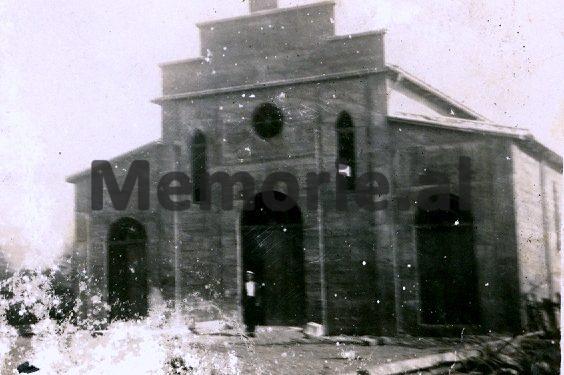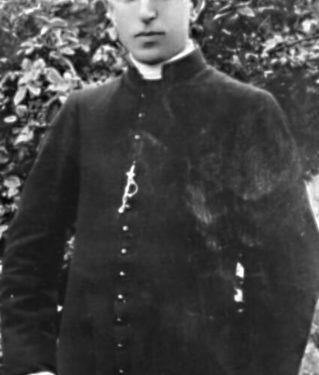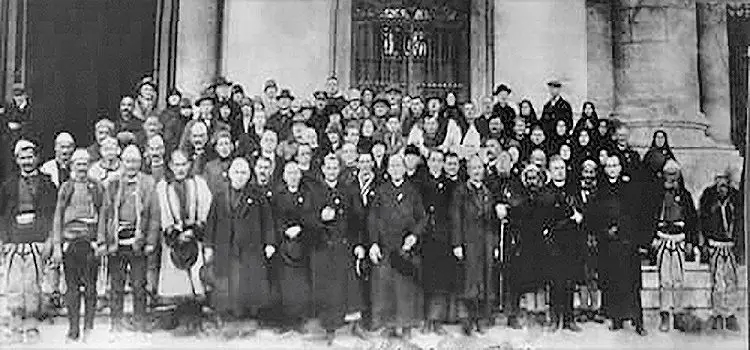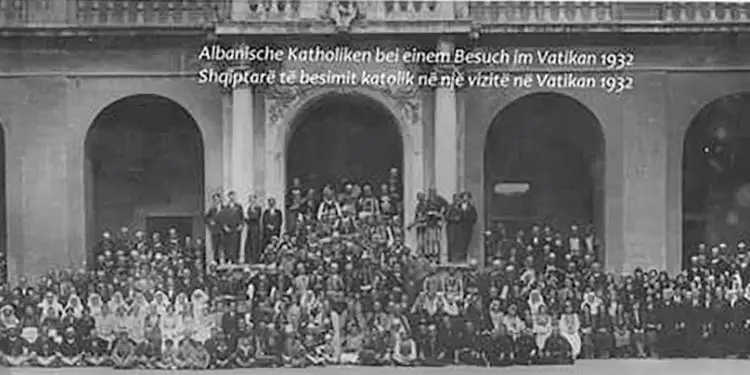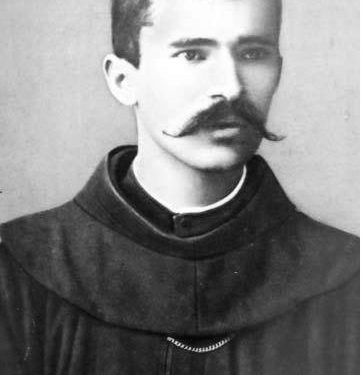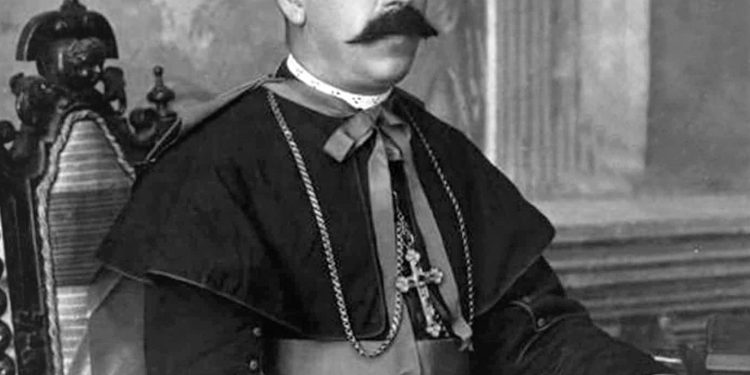NIKOLLË LOKA
AV.ALFDRED DUKA
NIKOLIN KURTI
WHY DOES THE POLITICAL ACCUSATION OF COLLABORATION NOT STAND?
Continuing the tradition of native Catholic clergy
Memorie.al/Shtjefën Kurti was born in Prizren on December 24, 1898 to parents Jak and Katrina. He attended primary school in Ferizaj. In September 1909, he entered the Pontifical Seminary in Shkodër, where, after learning the Italian language for a year from Maestro Doçi, he entered the Seminary, and later Philosophy.
In 1917, in the fall, he went to Innsbruck (Austria); was a boarder at “Canisianum” where he studied Theology for the school year 1917-’18 at the University of K.K. of Innsbruck. Since in the fall of 1918 Austria-Hungary capitulated, he returned to continue his studies of Propaganda Fise; and there he completed his studies at the University of that College, in 1921.
According to rich archival documentation, Shtjefën Kurti did not have preferential relations with Italians who were engaged in military or civil structures during the years of occupation. During the first trial, the Prosecutor accused Dom Shtjefën and other clerics: “The defendants Don Shtjefën Kurti and Father Pjetër Meshkalla collaborated closely with the occupier and contributed to the stabilization of their regime in Albania the defendant Don Shtjefën Kurti, during the Italian occupation, was the Chaplain of Villa Jakomon, where he performed informative services in favor of fascism.”
In order not to hinder the spiritual service to the believers, the church had declared its neutrality towards politics, as this neutrality was then understood, but had always emphasized its social mission and national commitment. Dom Shtjefën Kurti, as an educated patriot, must have welcomed the fascist invasion with anger, as before, he dedicated himself to the spiritual service and social mission of the church. Under those conditions, cooperation with state officials, whoever they were, was indispensable. Dom Shtjefni concentrated on his duty, thinking that a good cleric can always help the country and judging him from the position of the cleric and how he performed his duty to his country from that position.
The judgment against cleric Kurti should be made taking into account the activity of the church as an institution and his activity as an individual within that institution. He had not collaborated with the occupier and the military structures of the occupation, as he had no business with them. On the other hand, the cooperation with the state structures, mainly Albanian, created under the occupation was done only for problems related to the smooth running of the work of the Church. Dom Shtjefni has continued the cooperation he had before with the Italian clergy even after the invasion, but he had publicly expressed his dissatisfaction with some of them, due to his neglect or underestimation. The Albanian Catholic clergy had in its composition Albanian and foreign clergy who were characterized by a sense of autonomy among them and a conflicting relationship between the secular and regular clergy, where the secular clergy was dominated by locals and the regular by foreigners. This conflict was caused by the patriotic feeling of the Albanian clergy. The Albanian Church lacked the classic structure of clear predominance of episcopal jurisdiction over ecclesiastical orders.
Shtjefën Kurti, as Dean of the Deanery of Tirana, had a position in the hierarchy of the Clergy that enabled him to direct the work of the parishes of his Deanery, where Albanian parishioners served. Of course, he also cooperated with the Jesuit missionaries, mainly Italian, when that cooperation was ordered by his superiors and was in the interest of the Church, but he also distanced himself from the actions of the foreign missionaries in violation of the rules.
Shtjefën Kurti fought to be asked about everything in his parish in Tirana as was the rule, defending the institution of the Dean and the vicar and generally managed to maintain his position, since the Church itself had a clear hierarchical structure, with defined powers and with the impossibility of those powers being removed or added according to conjunctures.
Can the spiritual service to the conquering believers be called cooperation?
The church as an institution treated believers equally and in any case could take positions about their positions in the state and society, without discriminating against them in faith. In Albania, but also in other countries, it has happened that a cleric takes off the veladon and grabs a weapon to lead a war, but it has not happened that a priest with the cleric’s veladon fights in the church. Of course, such a position was not expected even for Shtjefa Kurti.
Was the exercise of the office of the Chaplain of the Royal Chapel collaboration with the invader?
The story of the Chaplain for Dom Shtjefën Kurti, was born from the needs that Queen Geraldine had for spiritual service, in the conditions of not knowing the Albanian language and then being pregnant, which made it difficult for her to perform religious rites in the church. The 22-year-old princess arrived in Albania at the end of 1937 and spent about a year and a half performing religious rites in the Royal Palace, the former Toptan Palace, where a small chapel was created for her needs. After the invasion, the Viceroyalty was placed in the newly built Palace of the Brigades, where until 1942, no religious ceremony was performed. The state authorities themselves had made the Chapel and then entered into communication for the appointment of the Chaplain.
As can be seen from Dom Shtjefën Kurti’s letter to his Archbishop, Monsignor Vincens Prenushin, it appears that Dom Shtjefën had met the Apostolic Nuncio and had previously received his consent for him to be the Chaplain. Dom Shtjefni cannot be held responsible for why he was chosen. The viceroy had plenty of Italian clergy who were willing to serve him, but this choice would give rise to misunderstandings. Jakomon needed to include as many Albanians as possible in his circle. The official letter that Prenushi sent to Archbishop Prenushi tells us how it came to the appointment of Kurt as Chaplain:
Parish Office of the Catholic Church
Tirana No. No. 33.
Durrës Archbishop’s Ordinary Office.
We, the undersigned, have the honor to bring to you P.T. Ordinary Office of the Archbishop of Durrës, the correspondence (Copies) that has continued until now regarding Mass in the Palace, between Emz. To the Apostolic Delegate of the undersigned.
We sign this; bring it to the Ordinary Office for information and action, maybe this would not be the way to correspond directly with the Delegate, but only through the non-rhetorical way.
Of that P.T. Ordinary service office.
Parish priest, Tirana, 1.IV.1939.
Don Shtjefën Kurti
The passing of the clerical practice in Arqipeshkvi, proves that the cleric Kurti had not shown any special enthusiasm as a “collaborator”, to capture that place that certainly gave him greater authority, especially in the eyes of state officials, but he wanted to be implemented with rigor church practices. Parish priest Kurt writes to Archbishop Prenushi “… I add that recently, I have been in charge of a small church in the Royal Palace, and there it is not too much to have a mass on Sunday, when we can. I, the undersigned, have the honor to ask you Mr. Ord. Archbishop to release the above-mentioned faculty to us as soon as possible”.
The services of an Albanian clergyman for the Vicar General were of interest to the Albanian church, which is so needy, that’s why it was well received by Monsignor Prenushi, who on this occasion congratulates the vicar “for his commendable work in the service of religion and the homeland” and reminds him that ” … in the committee of civilians, that is, the executive committee, don’t forget the part of the Italian people living in the capital, and some of these members will also be included, because of this celebration, which we will enjoy, I will gather around the Pope soon all the Catholics of the world, wherever they are, and there is also this case of cooperation, a new manifestation of brotherhood, which we have the duty to bring. They have this job, which of course gives us honor…”.[4] As it seems, even in that situation the church was committed to “social harmony” between different communities, even when this harmony had problems, as it had happened before. The conflict between foreigners and locals did not arise with the fascist occupation of the country. Since the time of the Ottoman occupation, within the Albanian Catholic Church, there had been conflict between the Albanian clergy and those of foreign nationality, mainly Slavs who were inclined to act against the national aspirations of the Albanians.
Looking at the ‘Shtjefën Kurti’ Fund, it turns out that there are few documents that prove his cooperation with the Italian missionaries, and in those few documents, where that cooperation comes to light, we see that there were problems between the parish priest and the missionaries, since the Italian clergy did not have willingness to respect the vicar’s powers, although they served in his parish. In fact, in general, there is a division within the clergy, where Albanians are more connected to each other than to foreigners. This practice came from tradition, however, the superiors of the church took care that the division was not natural.
But even foreigners did not feel at home and kept their own relationships that were easily noticed. These connections were sometimes reflected in the work of the clergy. Italians preferred to receive spiritual service from Italian priests, often breaking the rules and ignoring the powers of the parish priest. Dom Shtjefni, who served everyone within the territory of his parish, had not allowed it to be overlooked because of the preferences of the faithful, even if they were Italian. In the letter he sends to Archbishop Prenushi, he expresses his displeasure and asks that that practice not be repeated.
Parish Office
The Catholic Church
Tirana, 17-1-1942
Prot. No. 29/42
P.T. Durrës Archbishop Ordinary Office
You went with the spies, ksi steku, we found that Fort i Nd. Father Santi, he went with the blessing on different occasions, he advised someone, Mr. Italian, like Mr. Martone Renata, street “Cerdoma de Rada” No. 2, to Mr. The other Castriata vs. Here, I was involved in the rights of the Parish Priest. We sign begging her P.T. Ordinary Archbishop’s Office, in order to draw attention to F. of Nd. Father Santi, in our opinion for two reasons: Why should he respect the target of the Parish Priest; Why does P. Santi (or anyone else) with those behaviors make us redder in front of those people who go to us with blessings that, remember that we are doing our duty, we are in front of a work done by one another and a gesture ours pours as if we had gone begging for alms.
I await the conclusion of this matter, I remain waiting. Memorie.al
To Mr. Ord. Aquip.
Parish Priest
Don Shtjefën Kurti




